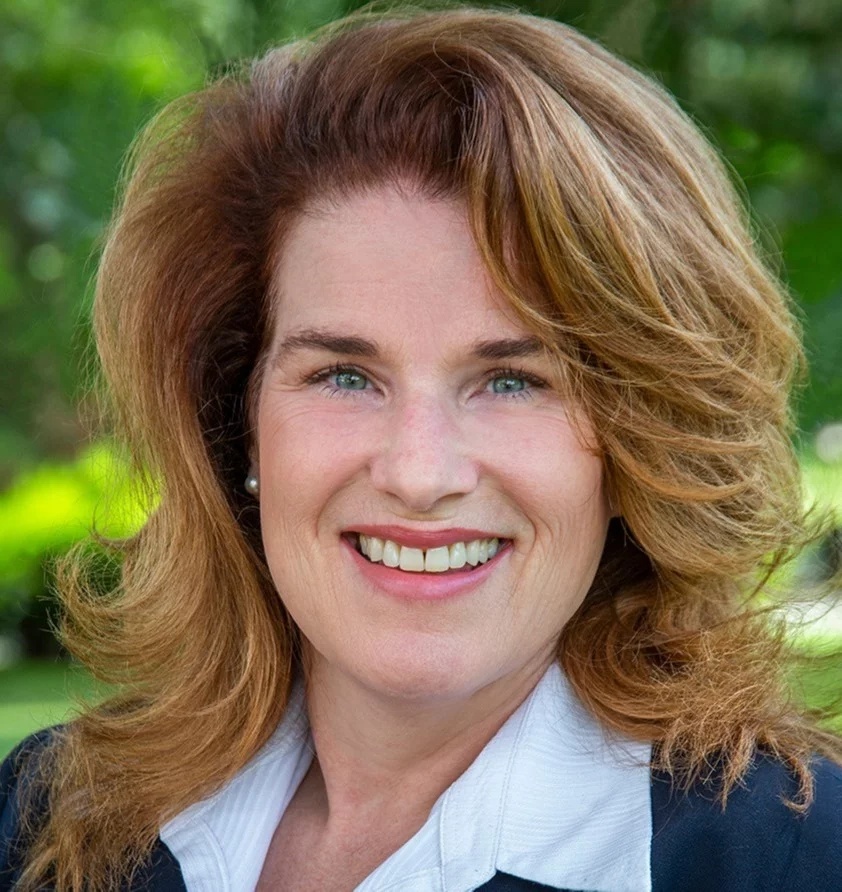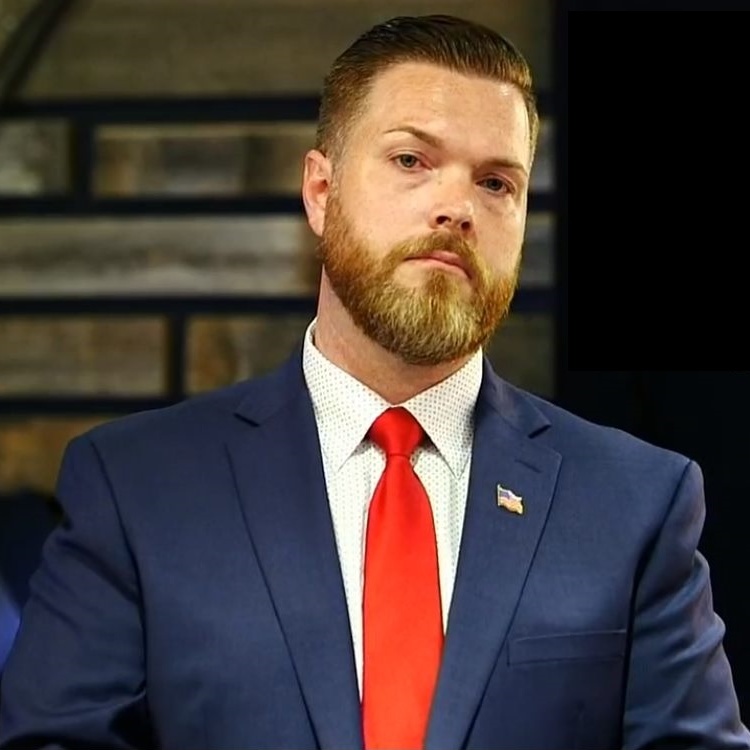Tulsa Election 2020: August 2020 Archives
Tulsa Mayor GT Bynum IV narrowly avoided a November runoff, winning re-election outright with 51.9% in this first round of City of Tulsa voting. 30-year-old Greg Robinson II, running to Bynum's left, garnered 28.8% of the vote. Ken Reddick, running to Bynum's right, finished third with 13.8%, followed by Ty Walker at 2.8% and Craig Immel at 1.9%, the remaining candidates were below 1%. Turnout was 70,745, with 23.0% voting early. Had another 2,637 voters turned out to vote for candidates other than Bynum, he would have faced a November runoff with Robinson.
I'll be on Talk Radio 1170 KFAQ at 7:30 am Wednesday morning to talk about the results with Pat Campbell.
I had an enjoyable time as a member of a panel of commentators for KJRH's election night coverage, talking about the results and their significance. One of the striking things about the conversation was hearing about the Democratic Party's endorsement of Robinson, setting a precedent that Republicans would do well to follow. The Tulsa County Democratic Party chairman said something about flipping a council seat, which was humorously revealing. We all know that political philosophy matters, even in city government, and that people have party affiliations, despite the lack of a partisan primary. About 15 years ago, I proposed an idea I called multi-partisan elections, in which candidates of all parties would run on the same ballot, but with party labels, which might include words and phrases other than the names of national parties. The label next to a candidate's name might be that of a local coalition formed around local issues.
I started playing around with maps. I have QGIS, an open-source graphical information system suite, precinct and municipal boundary shapefiles from OK Maps, and precinct-by-precinct results from the Oklahoma State Election Board. I used Microsoft Access (I know, I know) to process the election board data before linking it to the precinct map. Here's my first, clumsy effort: A map showing the "swing" between Bynum's June 2016 vote and his vote today. The deepest purple shows precincts where Bynum's share of the vote fell by at least 25 percentage points; darkest green shows where Bynum's share of the vote went up by at least 25 points; in precincts with no color, his 2020 share of the vote was within 5% either side of his 2016 share.
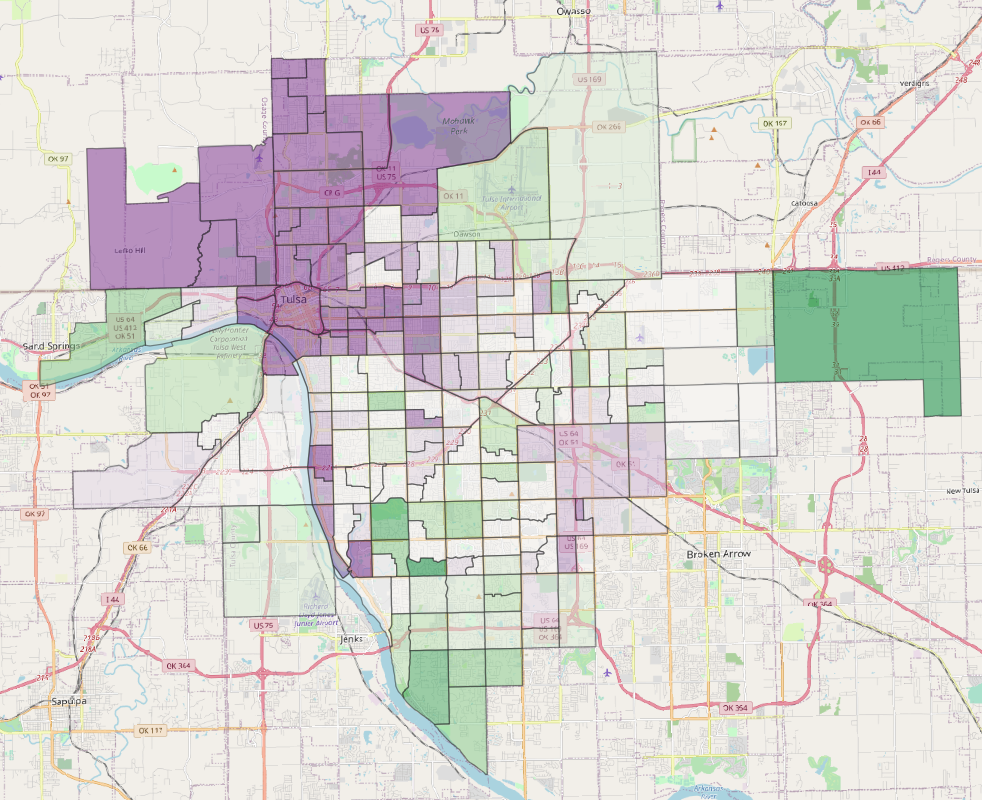
Recall that in 2016, Bynum was effectively the Democratic nominee, the progressive candidate, as no prominent Democrat sought the office. Bynum won with support from Democrats along with those Republicans who were disappointed with Dewey Bartlett Jr's service as mayor. This year, Greg Robinson captured those left-wing voters, while there was no well-funded or well-organized candidate to Bynum's right. Bynum's vote slid most dramatically in north Tulsa and midtown, while his vote improved in south Tulsa.
Now, there are all sorts of problems with the map above. I haven't figured out how to tweak the projection so that a line drawn north through the center of Tulsa points straight up (the shapefiles I'm using are based on Oklahoma as a whole). I haven't figured out how to add a legend, and I didn't bother adding precinct numbers as labels. I haven't done an intersection between the precinct shapefile and the municipal shapefile so that I only show the portions of precincts that are within the city limits. There's no proprietary watermark. All that said, it does give you a picture of how votes shifted, and I hope to put together additional (and more attractive) maps in the near future.
Here's one more: The percentage voting yes or no for Proposition 2, which involved changing a handful of references in the City Charter from he/him to they/them to be "inclusive." Darkest blues are yes > 70%, darkest reds are yes < 30%. Overall, the proposition passed by the narrowest margin of the five on the ballot, with 54.7% support.
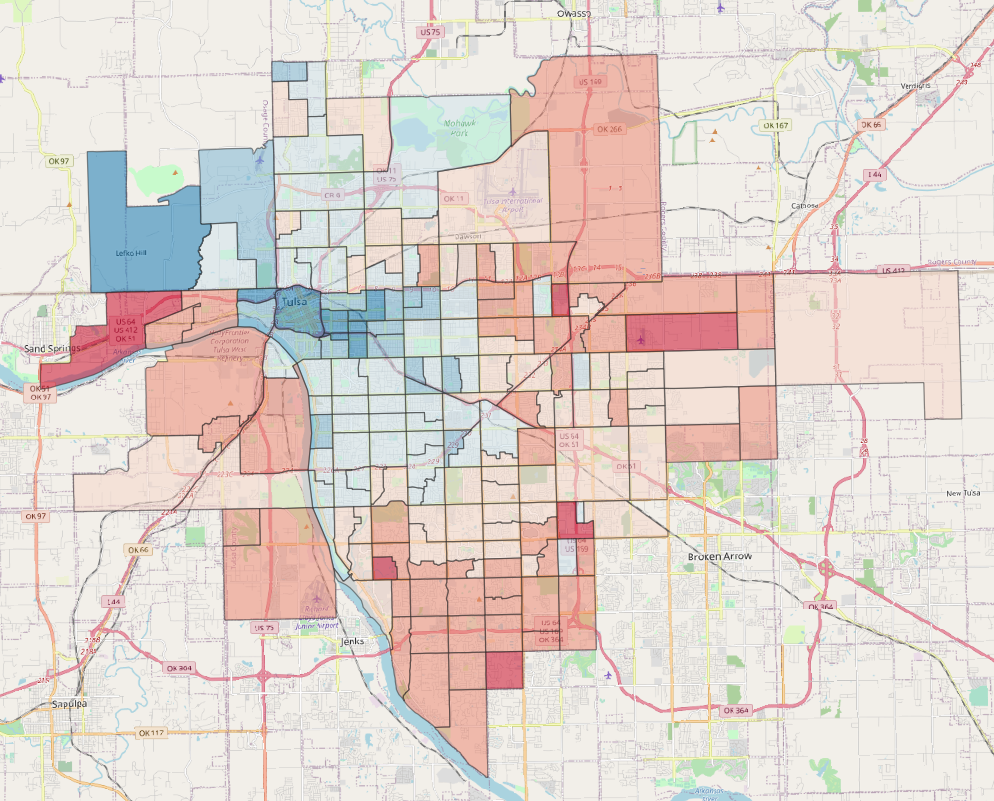
 Polls are open today until 7 p.m. The Oklahoma State Election Board's online voter tool will let you know where to vote and will show you a sample of the ballot you'll see.
Polls are open today until 7 p.m. The Oklahoma State Election Board's online voter tool will let you know where to vote and will show you a sample of the ballot you'll see.
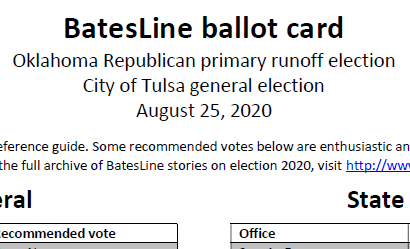
Click the link above to download a printable ballot card listing the candidates I'm recommending and (if in the district) voting for in the Oklahoma runoff and City of Tulsa general election on August 25, 2020. Below I'll add more detailed information on issues and candidates. (This entry will change as I decide to add more detail, link previous articles, or discuss additional races between now and election day. The entry is post-dated to keep it at the top.) Please note that the rows on the chart are alternately shaded and unshaded for readability. The presence or absence of shading has no other significance.
As I posted this late Thursday night, there were races I had planned to write about in detail, but time was short, people were voting, and many have asked for a summary of my recommendations, so I've started by posting my printable ballot card and will fill in some details as I have opportunity between now and Tuesday.
Below you'll find some links to websites I found helpful in learning about candidates, their values, backgrounds, and political opinions.
When in doubt, I look at campaign contributions, which often tell a story about a candidate's ideological leanings or close ties with local power brokers. Campaign expenditures can be telling, too: Certain consulting firms have strong associations with the pay-to-play culture that makes our Republican supermajority legislature more crony-infested than conservative. Then there are principled conservative consultants; their presence on a campaign team is always a hopeful indication that the candidate is also a principled conservative.
In addition to runoffs in federal, state, and county primary elections, the City of Tulsa has an election for mayor and seven of the nine city councilors. (The auditor and the other two councilors won re-election unopposed.)
State law requires City of Tulsa campaign contributions and expenditures to be submitted to the City Clerk's office; the City Clerk posts them on the City's website. Sadly, many city candidates don't seem to have noticed that their pre-election reports were due on Monday, August 17, 2020, even though that information was included in the election packet that was provided to each city candidate who filed for office and which was also posted on the county election board website.
NOTES ON SPECIFIC BALLOT ITEMS:
U. S. House, District 5: Terry Neese. Winner of this runoff will go on to try to win back the seat taken two years ago by Kendra Horn, Oklahoma's lone congressional Democrat. The other runoff candidate, State Sen. Stephanie Bice, voted to raise taxes on Oklahomans in 2018, bypassing a vote of the people. I should note that there are controversies surrounding Neese's business practices and claims of Native American roots. (My primary pick, David Hill, would have been a much better choice than either Neese or Bice.)
Senate 35: Cheryl Baber. Baber is a known quantity among conservatives in state and local conservative circles. Creekpaum's strong backing from "the Kaiser System" should worry conservatives. Baber is the only candidate in the race who was wise enough to oppose SQ802. Baber has been endorsed by Governor Stitt, Senator Lankford, former Governor Keating, and the current and previous senators for District 35, Gary Stanislawski and Jim Williamson, both solid conservatives. I'm hoping this year will be an echo of Stanislawski's first race in 2008: City Councilor Cason Carter, a favorite of the Money Belt establishment, ran first in the primary, 44.5% to 40.6%, but fell short of a majority and lost the runoff to Stanislawski.
City of Tulsa proposed charter amendments: Yes on 1, 3, 5 (the odds are good), No on 2, 4. Click the link to read the actual charter changes that each proposition would enact, and why I support or oppose each.
Mayor of Tulsa: Ty Walker (R). Walker is a small businessman and a political conservative who deals with Tulsans from all walks of life on a daily basis. As someone who has lived on both sides of the tracks, as he puts it, Walker can be a bridge to link the disparate communities of our city, with a focus on encouraging home-grown businesses. This was a tough call, but I believe that Walker is the better candidate of the two conservatives running. You can read his response to the BatesLine questionnaire here. You can read my comments on each of the candidates in my article endorsing Walker.
The incumbent mayor is blind to the needs of the city beyond his little Midtown Money Belt world, indecisive, two-faced, and in thrall to progressive philanthropy. His disastrous handling of COVID-19 and of the George Floyd protests managed to make everyone angry at him, inspiring seven candidates from across the political spectrum to run against him.
In the council races, I support replacing all of the City Councilors, except Cass Fahler in District 5.
Tulsa Council District 1: Jerry Goodwin (D).
Tulsa Council District 3: Paul Eicher (D).
Tulsa Council District 4: Kathryn Lyons (R). Lyons was the only District 4 candidate to respond to the BatesLine questionnaire, and she gave solid answers. (The incumbent councilor, Kara Joy McKee, allowed constituents' homes to be condemned without investigating the situation, and she made a promise she didn't keep about initiating the revocation condemnation promptly at the beginning of 2020.)
Tulsa Council District 5: Cass Fahler (R). At a time when law enforcement is under attack, we need a strong advocate for law and order on the council.
Tulsa Council District 6: Christian Bengel (R).
Tulsa Council District 7: Justin Van Kirk (R).
Tulsa Council District 9: Jayme Fowler (R).
MORE INFORMATION:
Here are some blogs, endorsement lists, candidate questionnaires, and sources of information for your consideration.
- Talk Radio 1170 Pat Campbell podcast archive
- Sheridan Church's Tulsa Town Hall candidate forum
- 918 Vote / League of Women Voters mayoral forum
- iVoterGuide: Candidate responses to a detailed questionnaire written from a conservative Christian point-of-view
- Muskogee Politico news, questionnaires, and analysis
- Muskogee Politico 2020 runoff election tips and picks
- Charlie Meadows's picks
- Oklahomans for Life candidate surveys
- Oklahoma Constitution newspaper's Oklahoma State Senate ratings and Oklahoma State House ratings.
- Endorsements from Tulsa Area Republican Assembly and other Tulsa conservative groups
- NRA-PVF endorsements and grades
- Oklahomans for Public Education 2020 voter guide: This is a kind of reverse-psychology voter guide. The red apple next to a candidate's name probably means he or she supports higher taxes, no reduction in school administrative bloat, and no meaningful educational choice for our children and their parents. You should treat a yellow triangle as a gold medal -- this is likely a candidate who will defend taxpayers' interests and work for school choice and educational efficiency.
TIP JAR: If you appreciate the many hours of research that went into this guide and into the rest of my election coverage, and if you'd like to help keep this site online, you can contribute to BatesLine's upkeep via PayPal. In addition to keeping me caffeinated, donated funds pay for web hosting, subscriptions, and paid databases I use for research. Many thanks.
UPDATE 2020/08/25, 12:46pm: I have updated the printable sheet to change my recommendation in Senate District 7, based on recent information from Jamison Faught.
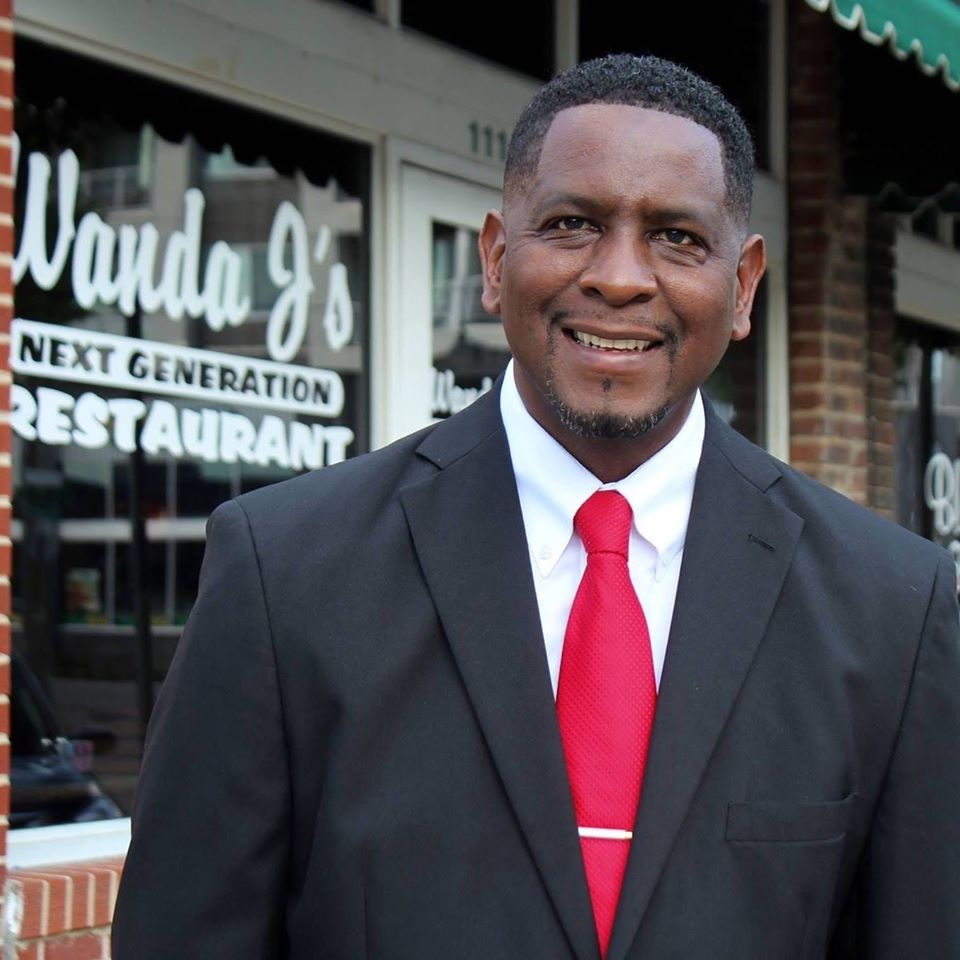
What looked like a sleepy re-election run, for Tulsa Mayor GT Bynum IV as recently as the beginning of May, with one declared opponent and a perennial candidate in jail, turned into a free-for-all. As soon as he had some tough decisions to make, the smiley guy that everyone liked was suddenly the weak-kneed wimp whom everyone despised. COVID-19 (aka the Chinese Communist Bat Virus) and Black Lives Matter protests, and the Trump rally which linked the two, left GT unable to find decisions that would make the vast majority of Tulsans happy. Instead, his vacillation managed to anger Tulsans left, right, and center, and the peak of the first wave of dissatisfaction fell just as filing opened for city office. Seven opponents filed to challenge his re-election.
The Bynum administration has reaffirmed my belief that executive experience in a mayor is not necessary for keeping the city running. (It may be that having a pulse is not necessary for keeping the city's basic functions running.) We've never had a mayor under the current charter with previous experience running a business the size of city government. The various departments that manage basic city functions continue to run regardless of who's mayor. Every mayor since 1990 has had someone either serving as a city manager in all but name (with a title like Chief Administrative Officer or Chief Operating Officer) or with the title City Manager, even though Tulsa's charter calls for a strong mayor, unlike the "weak mayor / council / city manager" government that Oklahoma City has and which is established under the default charter in the state statutes, used by cities like Broken Arrow. Even under a wishy-washy schmoozer like GT Bynum IV, the machinery of city government chugs along. The trash is picked up, clean water flows through our faucets, street projects move forward, police officers and firefighters do their essential work. It's a bit like the body's autonomous nervous system, keeping the heart pumping, the lungs going, and the guts digesting regardless of what is or is not happening in the brain.
What we do need in a mayor is a functioning moral compass, an ability to make sound decisions and stick with them, and a vision that encompasses all of Tulsa. He needs to understand government's proper sphere in the functioning of society alongside families, churches, businesses, voluntary organizations, and other non-governmental mediating institutions, as well as the practical limits on government's ability to fix problems without creating others. We don't have that right now, and I only see one candidate that comes close to meeting that set of criteria: Ty Walker. I have voted for Walker, and I encourage you to do the same.
If you make decisions based on your billionaire backers' priorities or what you see your buddy in Oklahoma City doing, if what you mean by "data-driven" is really just following the conventional wisdom that will make you look smart in the eyes of New York Times reporters or among your homies in the Midtown Money Belt, you're going to have a tough time when difficult dilemmas come your way, and you won't be serving the best interests of the citizens.
A few examples of Bynum IV's bad judgment and lack of vision (from memory, so no links):
- Supporting a tax package (as a councilor and mayoral candidate) that included unnecessary low-water dams, then failing (as mayor) to use the Muscogee Creek Nation lack of interest in funding as an opportunity to repurpose taxpayer dollars in more useful ways.
- Decreeing by executive order that the City of Tulsa will officially pretend that there is no valid distinction to be drawn between real women and autogynephiliacs, thus endangering private spaces for females and separate female athletic competition.
- Allowing the condemnation of a historic neighborhood where young families have been reclaiming old homes in order to protect an office building that was built in a 100-year flood plain, rather than finding a solution that would mitigate stormwater issues while saving the neighborhood.
- Allowing other historic neighborhoods, like Crutchfield and Crosbie Heights, to live under the threat of blight declarations.
- Pushing restriping of city streets to the confusion of the vast majority of street users (drivers).
- Being a tough guy for Pat Campbell's conservative audience, vowing not to cave to protestors, and then a few hours later, caving to protestors, cancelling Tulsa's participation in a show (LivePD) which seemed to offend the protestors because it showed Tulsa Police officers ably handling difficult challenges.
- Waffling on President Trump's appearance in Tulsa -- neither asking him to stay away out of concern for the spread of COVID-19 and civil unrest, nor taking advantage of Trump's visit to show off Tulsa to our nation's leaders or to call the President's attention to opportunities for city/federal cooperation.
- Choosing not to institute a curfew. Other cities used curfews to allow peaceful protests to continue, while halting after-dark gatherings that often led to the smashing of store windows and dangerous obstruction of major streets.
- Shutting down Tulsa's small retailers while allowing big-box stores which sell the same products to stay open during the pandemic. Bynum followed the herd, rather than creatively adapting lessons from places like Hong Kong, which combined moderate closures (schools and large gatherings), voluntary mask wearing, and reduced business capacity to allow businesses to stay open.
- Pushing for an Office of Independent Monitor that would subject police officers to the oversight of a board without any law enforcement experience and without direct accountability to the public.
- Pushing to raise the permanent sales tax level to pay for a basic function of government.
I could go on, but I need to finish this and get some sleep.
Bynum needs to go, but who should replace him? Can a challenger beat an incumbent who has raised over $600,000 for re-election? Let's go through our list of options, starting with a few easy discards.
Ricco Wright is on the ballot but ended his campaign after attempting to handle an accusation of sexual assault by stating his belief in the woman's account (Believe All Women!) but implausibly blaming his actions on being "roofied." (Rohypnol -- "hypno" is in the name -- causes "loss of muscle control, confusion, drowsiness and amnesia," not uninhibited sexual aggression.)
I discussed perennial candidate Paul Tay during the filing period. Someone who filed for office the day he finished a five-month jail sentence for outraging public decency doesn't deserve further consideration.
Zackri Whitlow seems to be running on a whim. He did not show up in the voter registration database in Tulsa prior to filing for office. He has not filed any campaign finance reports with the City Clerk, not even a Statement of Organization, indicating that he has not raised or spent any significant money to reach and persuade voters. He has appeared in a few online forums to promote a few pet ideas.
Craig Immel has impressed me with his willingness to respond to voters' questions on various platforms, including the BatesLine mayoral questionnaire. Even when I can't agree with him, I respect his thoughtfulness. I also admire his willingness to serve as the lead plaintiff against the plan (supported by Bynum) to convert riverfront park land to a basic shopping center. Of all the candidates, he has the best grasp of urban planning and development issues. If it were a head-to-head matchup between Immel and Bynum, I'd vote for Immel. But on other issues, he is left of center. His support for SQ 805 and SQ 780 points to a naive view of crime and its causes that would jeopardize the lives and property of Tulsa citizens. His stated disdain for the State of Oklahoma reflects an unbecoming elitism and sends a signal to small-town and rural Oklahomans who come to the metro area for jobs that they'll feel more at home in the suburbs.
Greg Robinson II has done an impressive job of organizing a substantial last-minute challenge to a well-funded incumbent mayor. His fundraising has unofficially surpassed $200,000 (but his campaign is one of several that has neglected to file the required pre-election report of contributions and expenditures). I've received almost as many mailers from Robinson as I have from Bynum, which points to a well-organized effort to reach and energize voters. In 2016, Bynum was helped by the fact that no Democrat bothered to file; instead, Bynum was effectively the Democrat nominee in the officially non-partisan mayor's race. Now Robinson may scoop up the base of Bynum's 2016 support.
Robinson's rhetoric and resume point to him being a doctrinaire leftist, but there are a couple of facts about him that are intriguing for the conservative voter: First, Robinson's father, Greg Robinson, Sr., was a Republican who came within 900 votes of unseating incumbent Democrat county commissioner Wilbert Collins in 2002. (Milton Goodwin, the Republican nominee in 1998, ran as an independent in 2002 and acted as a spoiler.) Tragically, Greg Sr. died suddenly of a heart attack at the age of 48, just 10 weeks after the election. Greg Jr. was a young teenager at the time. Second, Robinson (Jr.) is a founder of Greenwood Leadership Academy, a charter school, so there may be some openness to school choice that the incumbent (whose parents could afford an educational alternative) doesn't share.
A conservative case could be made for preferring Robinson over Bynum. It would be refreshing to have a mayor, for the first time in almost three decades, with a clue about life outside the Money Belt. And I've noticed that it's easier to mobilize certain Republican officials to oppose bad ideas when they've been proposed by Democrats; if a RINO backs the idea, they fall in line.
To the alarmists out there: No one can win on Tuesday unless they get 50% of the vote. If a majority of voters don't vote for Robinson, he won't win. If a majority of voters don't vote for Bynum, he won't win on Tuesday. A November runoff, even if it's between Bynum and Robinson, the two best-funded candidates, would be a better result than if either candidate succeeded in getting 50% on Tuesday. Both would have to find ways to reach out to the conservatives they've spurned if they want to win. But I'd rather see a conservative in the runoff.
A conservative with political experience was unlikely to risk running against a well-funded, well-heeled incumbent who was (until a few months ago) quite popular and a registered Republican, albeit a RINO. So the two conservative claimants in the race are not well-funded, are still working their day jobs, don't have the background in city policy that you might hope for, and do have some things in their past that aren't very attractive.
Ken Reddick was the first to step up to challenge Bynum. He ran a credible race for City Council District 7 in 2018. But despite the early start, he failed to lay the groundwork necessary for a successful challenge, a task that involves fundraising, garnering endorsements (or at least persuading people not to line up behind the incumbent) Reddick has filed no campaign contribution and expenditure reports at all beyond the Statement of Organization for his campaign committee.
Restaurateur Ty Walker joined the race on the final day of filing. He had been thinking about preparing for a 2024 run, but he was persuaded by some regular customers to go ahead and file this time around. He also ran for City Council in 2018, in the race for the open seat in District 5.
I reached out to both candidates shortly after filing closed and encouraged them to meet and discuss if either of them would be willing to drop out and support the other. As far as I know that never happened. This would have been an ideal situation for state or county Republican leadership to intervene, perhaps by holding an endorsing convention to take the place of the primary that was eliminated by the move to non-partisan elections. But despite my private encouragement, nothing was done.
Because of CCP Bat Virus (which is real, which can kill and maim people, and which spreads through droplets) I have minimized my person-to-person interactions and have been grateful that I can work, for the most part, from home. But I did attend one meet-and-greet each for Reddick and for Walker. At the Reddick meet-and-greet at the Interurban Restaurant, I watched Reddick passively listen to various attendees vent their spleens about their pet issues. I waited around for close to an hour in hopes that the candidate would stand up and talk about his priorities and plans and take questions, but I got tired of waiting and went home.
A few weeks later I attended Ty Walker's meet-and-greet in a supporter's home. Walker had been out knocking doors in neighborhoods around Tulsa. His campaign team seemed sharp and focused (although they failed to get his pre-election contribution filing in as of this time). He held forth for a couple of hours, talking about his priorities and answering questions from the audience. I didn't agree with all of his answers, but his principles and his heart were clearly in the right place. Many of those differences reflect a perspective formed by growing up in Tulsa's North Community. As he points out often, he has lived on both sides of the track and uniquely among the options on our ballot can be a bridge across that track.
A BatesLine reader writes:
I believe that Ty Walker has the skills, temperament, and ethics needed for the job as mayor of Tulsa.
- I believe him to be the most free of political influence. With several activists running for the position, and a mayor with a track record of heavy outside influence, Walker leads the pack.
- I believe he's best equipped to guide the city through the economic recovery necessary from Covid. As a small business owner, specifically in the food service industry, he's well aware of the hardships small businesses face. I believe he's capable of not only seeing the current economic recovery, but he can help underserved communities grow their currently limited economic infrastructure.
- I believe he's an inspiration to everyone on the personal struggles needed to be successful, and I believe that will help him be a positive agent for growth and helping the city mend it's current socio and economic divides.
- I believe he's the most practical candidate, in terms of wanting to achieve practical goals. He's a crawl - walk - run type of candidate who won't be overly fixated with trying to fix everything with one singular action.
Walker isn't beholden to local or national philanthropists or interest groups. As someone actively involved in owning and running a restaurant, he's understands what our small businesses need as we try to recover from the COVID-19 shutdowns. He also understands the specific challenges that exist in the parts of the city where businesses have had difficulty taking root. He understands what it is to try and fail and try again. His vision is practical consisting of modest, incremental steps.
Something I noticed when watching the Sheridan Church Tulsa Town Hall forum (which was very well done) is that Ty Walker was one of the few candidates actually settled and involved in a church. (The question about church involvement is asked at about 58 minutes into the video.) Walker is an associate pastor at New Salem Missionary Baptist Church in Okmulgee. At the beginning of this video from a few weeks ago, Ty Walker is giving some remarks (the video comes in after he has started) prior to the sermon, reminding the congregation that we will all meet death, none of us know when, and that we should all seek to be ready, walking in God's will.
Ty Walker is the candidate for Tulsans who want to bridge the cultural and ethnic divides in our city (without the kind of radical policies that are tearing other American cities apart), who want a conservative mayor who values the free market, economic opportunity, and growing local business (rather than lavishing incentives on billionaires trying to land the big fish).
I voted (at the election board Friday) for Ty Walker for Mayor, and I urge you to do the same. If he wins against all odds, Tulsa would be blessed. If Walker falls short, a large vote for him would signal that the remaining candidates need to reach out to conservatives in the November runoff.
A postscript: A few weeks ago, I was made aware of some accusations about Ken Reddick's marital history. I've been to the county court clerk's archive, looked at his divorce file, asked him some questions. I want to be careful about how I talk about these things for the sake of all involved, and I hope to post something this evening for the many people who are asking about it. Bottom line is that in my opinion there are internal inconsistencies in Ken Reddick's own account of his past and between his account and the official records, and that reinforces my doubts about his qualities as a candidate and a leader.
Back on August 12, I sent the three eligible candidates for City Council District 4 a questionnaire using the email addresses provided in their declarations of candidacy or on their websites. The questionnaire included the 18 questions I asked the mayoral candidates, plus a question about neighborhood conservation districts and a question about the candidates for mayor.
I received only one reply, from Kathryn Lyons.
Age: 53
Employment: Community volunteer, former property manager
Neighborhood: Lakewood Heights
Voter registration: Republican
Campaign web page: kathryn4tulsa.com
Campaign Facebook page: Kathryn Lyons for Tulsa City Council
The detailed responses to the questionnaire, if you're viewing this on the home page, are after the jump.
Last Wednesday, BatesLine sent a questionnaire to the six serious candidates for Mayor of Tulsa, using the email addresses provided in their declarations of candidacy or on their websites. We sent two reminders. We received replies from three candidates: Craig Immel, Ken Reddick, and Ty Walker.
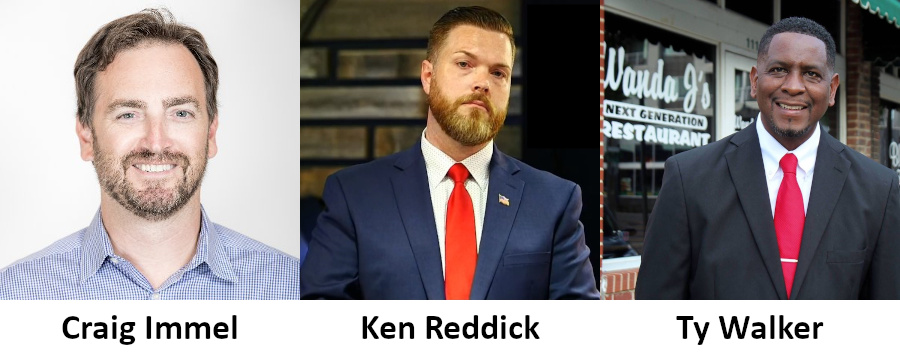
The survey consists of 18 questions, selected and adapted from over 60 questions suggested by BatesLine readers. I tried to cover a wide range of topics while keeping the number of questions at a reasonable level for candidates busy in the final stages of the campaign.
Rather than split the answers up in separate entries by candidate, I'm presenting them side-by-side, which runs the risk of someone reading an answer and connecting it with the wrong candidate. To help you mentally associate the answer with the candidate who gave it, I've added social-media-type icons in front of each response.
Here is a brief overview of the candidates who responded to the questionnaire:
Age: 44
Employment: Construction manager
Neighborhood: near Gilcrease Hills (Council District 1)
Voter registration: independent
Campaign web page: movetulsaforward.com
Campaign Facebook page: Craig Immel - Independent for Tulsa Mayor
Twitter account: @MoveTulsaFwd
Immel hosted a Reddit AMA (Ask Me Anything) session.
Age: 37
Employment: Owner, Clean Slate Contracting LLC and Tulsa Fence & Roofing Company
Neighborhood: Regency Park (Council District 7)
Voter registration: Republican
Campaign web page: kenreddick4mayor.com
Campaign Facebook page: Ken Reddick for Tulsa Mayor 2020
Age: 54
Employment: Owner, Wanda J's Next Generation Restaurant
Neighborhood: Virginia Lee Addition (Council District 5)
Voter registration: Republican
Campaign web page: tywalkerfortulsa.com
Campaign Facebook page: Ty Walker for Tulsa Mayor
The detailed responses to the questionnaire, if you're viewing this on the home page, are after the jump.
Five amendments to Tulsa's city charter -- our city's constitution -- will be on the August 25, 2020, ballot. As usual, the summaries you will see on the ballot paper only tell part of the story.
For the TL;DR folks, here are my recommendations:
Proposition No. 1: Yes
Proposition No. 2: No
Proposition No. 3: Yes
Proposition No. 4: No
Proposition No. 5: Yes
Or to put it even more briefly, vote YES on the ODD numbered propositions, NO on the EVEN numbered propositions. ODD is GOOD, EVEN is BAD.
Now the details, after the jump. Strikethroughs show language that would be deleted if the proposition passes, underlines show language that would be added.
I'm hearing that minions of Mayor Bynum IV are putting the word out that voting for one of his conservative opponents in the August 25, 2020, election will help elect someone further to the Left than the left-of-center Bynum. The rumor is self-serving garbage, preying on ignorance of the confusing new election process that Bynum IV and friends quietly slid into the charter three years ago, the sixth change to the city election process in 11 years.
Here's the truth: Unless one candidate has the support of 50% of the voters on August 25th, there will be a runoff in November with at least two candidates. Putting it another way: If a majority of voters vote against incumbent Bynum IV, and if a majority of voters also vote against Greg Robinson, the leading registered-Democrat candidate, neither will win the election outright on August 25.
The crucial task for conservative Tulsans who want a conservative mayor is to unite on August 25 behind one of the two conservative alternatives to Bynum (Ty Walker or Ken Reddick) so that we have a real conservative to vote for in November and Bynum can retire from being a failed mayor and resume his career as a schmoozer.
2020 is the first Tulsa mayoral election that will use the new election procedure approved by voters in a low-turnout November 2017 special election. (Only charter amendments on the ballot; only 10,425 votes were cast on this ballot item compared to 58,848 in the June 2016 mayoral primary. There ought to be a state law limiting city charter changes to high-turnout elections, or perhaps setting the threshold as 50% of the votes in the previous presidential election.)
Here is a direct link to the current charter language, Article VI, Section 2.2. Here's the key language:
If a candidate for office is unopposed at the election or becomes unopposed by death, disqualification or withdrawal, such candidate shall be deemed elected. If a candidate for an office receives more than fifty percent (50%) of all votes cast for that office at the election, such candidate shall be deemed elected. If more than two (2) candidates file for an office and no candidate receives more than fifty percent (50%) of all votes cast at the election for that office, the names of the several candidates for the office receiving the greatest number of votes totaling fifty percent (50%) at such elections shall be placed on the ballot at a run-off election in November, on the day specified by the laws of Oklahoma, and the candidate receiving the greatest number of votes cast at said run-off election shall be deemed elected. In the event of a tied vote among the said candidates, the election shall be decided by lot.
The same process applies to election for any Tulsa city office, including city councilors and the city auditor.
Note that the runoff may involve only two candidates, but if votes are split evenly enough between the candidates, it may involve more. Here are a few possible scenarios. Note that the numbers are entirely made up -- I have no polling data -- used simply to illustrate how different spreads of votes among candidates will lead to different runoff possibilities.
Scenario 1 is simple: If a majority of the August 25 voters support one candidate, he is elected to a four-year term as mayor. This is what happened in June 2016.
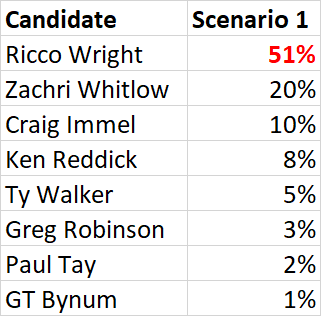
In Scenario 2, no one gets a majority of the votes on August 25, but the total of the top two is greater than 50%. In the illustrated scenario, Robinson and Bynum are the top two ranking candidates, and the sum of their percentage is 60%, so those two candidates advance to the November runoff. Note that in this hypothetical scenario, the two conservative candidates, Walker and Reddick, have enough votes that if they had all coalesced behind one of the two, the conservative candidate would have beaten out Bynum for the 2nd spot in the November runoff.
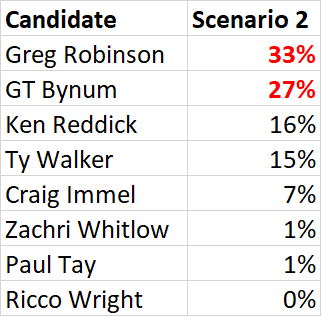
Scenario 3 illustrates what happens if the top two candidates fall short of a combined 50% total. In this case, Robinson and Walker would combine for 49% of the vote, so the third-place candidate, Immel, also would advance to the November runoff. Since those three combine for 68% of the vote, the condition would be satisfied, and no more candidates would advance to the runoff.
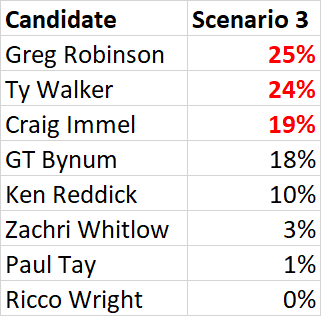
Scenario 4 is an extreme example to illustrate what would happen if the voters were very evenly spread among all seven of the active candidates. The top three candidates combine for only 46%, so one more candidate would have to be added to the November runoff ballot to reach the 50% threshold.
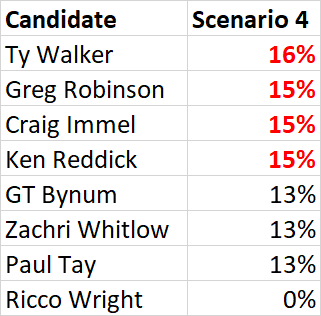
Scenario 5 is the most extreme hypothetical of all. Supposing all eight candidates got exactly the same number of votes -- 12.5% each. In this case, four candidates would advance (because the language says "totaling 50%," not exceeding 50%), and which four candidates advance would be decided by lot.
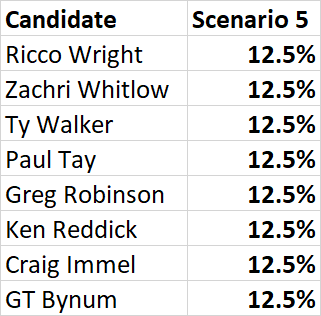
Note that there is no runoff after the November runoff. If more than two candidates advance to the November runoff, the election becomes a first-past-the-post race -- the candidate with the greatest number of votes, even if well short of a majority, is elected.
